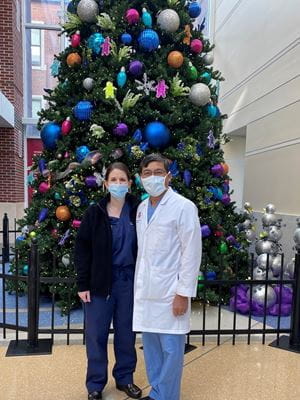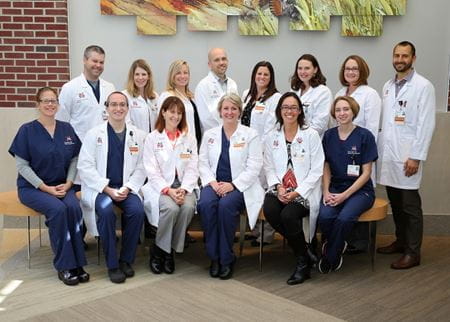As a child, Michele Saysana was terrified of hospitals. Ironically, she became a pediatric hospitalist, working almost exclusively in the hospital environment. She focused on making hospital stays less scary for children — and adults, too — a journey that led her to become the first chief quality and safety officer at Indiana University Health.
In October, Saysana, MD, MHA, stepped into a new leadership role as the executive associate dean for clinical affairs at the Indiana University School of Medicine, where she is also a professor of clinical pediatrics. In a dually appointed position with IU Health, Saysana serves as senior vice president of academic medicine and president of the IU Health physicians’ group, which is unifying statewide to become IU Health Medical Group. She previously served as chief medical officer for the Adult Academic Health Center (AAHC), which includes IU Health Methodist and University hospitals.
In a joint letter announcing Saysana’s appointment, IU School of Medicine Dean Jay L. Hess, MD, PhD, MHSA, and Dennis Murphy, MHA, president and chief executive officer of IU Health, commended Saysana’s “commitment to advancing safe, effective practices that help us provide leading-edge care and support innovative research and education.”
Saysana assumes this important leadership role at a time when the health system is transitioning to a new electronic health record system, forming a united medical group, and opening a new hospital at the AAHC alongside IU School of Medicine’s flagship Medical Education and Research Building, set to open in summer 2025.
Amid these transitions, Saysana sees opportunities to improve patient care.
“Health care is complicated,” she said. “If we always think about what’s best for the patient, we’ll make the right decisions. The rest of it — the metrics, the finances — all of that will follow if we keep the patient at the center of our decision making.”
Taking care of Indiana families and refugees
The roots of Saysana’s career in academic medicine go back to her youth. She volunteered as an athletic trainer at Noblesville High School and was invited to shadow an orthopedic surgeon who let her observe an ACL repair surgery. At Indiana University, Saysana majored in biology and minored in psychology on the premed track.
 When she was admitted to IU School of Medicine—Muncie, Saysana joined the smallest class she had ever been part of — just 16 medical students on the regional campus. One of her peers, Chan Saysana, MD, would later become her husband. Today he is a pediatric anesthesiologist at Riley Hospital for Children and an assistant professor of clinical anesthesia at IU School of Medicine.
When she was admitted to IU School of Medicine—Muncie, Saysana joined the smallest class she had ever been part of — just 16 medical students on the regional campus. One of her peers, Chan Saysana, MD, would later become her husband. Today he is a pediatric anesthesiologist at Riley Hospital for Children and an assistant professor of clinical anesthesia at IU School of Medicine.
“I always tell people my husband is way more interesting than I am,” Michele Saysana said. “He and his family came to the U.S. in 1976 as refugees from Laos and were the first Laotian family to be resettled in Indiana.”
That personal connection would lead Saysana to volunteer with Exodus Refugee, a nonprofit that helps refugees establish new lives in Indiana. She served as the organization’s president for 10 years. She also coordinated IU Health’s response to the health care needs of about 7,200 Afghan refugees who came to the Indiana National Guard’s Camp Atterbury in 2021 after the Taliban took over their home country.
“I did it partly to honor my husband’s family but also to provide a voice for people who don’t have a voice,” she said of her work with Exodus.
Every step in Saysana’s journey has been fueled by her desire to “make things better” for people who find themselves in scary or unfamiliar places — including the hospital.
Saysana joined the IU faculty in 2006, just as the Department of Pediatrics was starting up a program in the emerging field of pediatric hospital medicine.
 “I enjoyed working with my specialty colleagues and taking care of patients from all over the state who came to Riley because their primary care physician or local hospital either didn’t know what the diagnosis was or couldn’t provide the services we could at Riley,” Saysana said.
“I enjoyed working with my specialty colleagues and taking care of patients from all over the state who came to Riley because their primary care physician or local hospital either didn’t know what the diagnosis was or couldn’t provide the services we could at Riley,” Saysana said.
Saysana instituted family-centered rounds, bringing pediatrics residents into the room when she and other pediatric hospitalists consulted with families about their child’s care plan.
“It’s thinking about how we can involve the family and facilitate their decision making and participation in their child’s plan of care,” she said, “because they’re the ones who are going to have to do that work when they go home from the hospital.”
Saysana gained perspective when she became a mother herself. She learned how difficult it could be to get babies to sleep through the night or to latch on correctly to breastfeed.
“It’s learning the art of medicine and the art of helping a mom who is struggling,” Saysana said. “I learned how hard it is to tell a parent, ‘You’re going to give this medication four times a day’ when it’s to a 2-year-old — good luck with that!”
Over the years, Saysana has received numerous recognitions for excellence in both teaching and clinical care, including being a three-time recipient of the Riley Children’s Health Red Shoes Award for family-centered care.
Being a woman in health care leadership
As a pediatrician, Saysana enjoyed mentorship and peer relationships with many female colleagues. But she noticed a change as she stepped into leadership. Saysana was the first woman to become chief medical officer for the Adult Academic Health Center.
“Sometimes I am the only woman at the table, and that comes with a sense of responsibility that I have to build this for those to come,” Saysana said. “I think about how I carry myself and how I negotiate and how I lead. My daughter wants to go into medicine, so I am constantly thinking about how I role model for her and for other young women in my life.”
 During the pandemic, Saysana served as the medical director of IU Health’s virtual care team and oversaw COVID testing for all IU Health team members, as well as for the NCAA Basketball Tournament in Indianapolis.
During the pandemic, Saysana served as the medical director of IU Health’s virtual care team and oversaw COVID testing for all IU Health team members, as well as for the NCAA Basketball Tournament in Indianapolis.
Lana Dbeibo, MD, MPH, began working with Saysana — and learning from her leadership — when both served on Indiana University’s COVID response team. Dbeibo led IU’s vaccination initiative as the medical director of infection prevention at Methodist Hospital. She continued collaborating with Saysana when Dbeibo later took on a quality and safety position within the Department of Medicine.
“Dr. Saysana taught me to be bold and encouraged me to pursue opportunities that would allow me to grow,” Dbeibo said. “She also taught me how to navigate the health care system and how to be strategic about initiatives that will have the most impact on improving patient care.”
Over the years, many of Saysana’s colleagues have encouraged her leadership aspirations, including several men in leadership. David Ingram, MD, MS, was the interim executive associate dean for clinical affairs prior to Saysana and has known her since she was a pediatrics resident.
“He has encouraged me all along the way,” Saysana said.
When she was considering making the “huge leap” from the pediatric environment to overseeing quality for hospitalized adults, Saysana met for breakfast with pediatrics department Chair Wade Clapp, MD. He, too, encouraged her next steps in leadership.
Interestingly, a group of four female pediatricians she connected with through the Children’s Hospitals’ Solutions for Patient Safety all went on to become leaders for safety and quality in the adult space at various institutions across the U.S. They continue to support each other as peer mentors.
Saysana urges her mentees to, “say ‘yes’ to things that sound interesting, even if they push you out of your comfort zone.”
 “I grew the most when I didn’t feel quite ready,” she said.
“I grew the most when I didn’t feel quite ready,” she said.
At the AAHC, Saysana created a robust infrastructure to improve patient outcomes which led to remarkable improvements in the hospital’s national safety rankings, noted Dbeibo.
“She has led initiatives both regionally and statewide that have advanced the health of our communities,” Dbeibo said.
In her new leadership role, Saysana still looks for ways to improve patient care. But she also strives to improve clinical training experiences both for IU School of Medicine faculty and their learners.
“It’s an incredibly exciting time in medicine, even though it’s hard,” Saysana said. “I’m excited about what we’ve been able to accomplish — and what’s yet to come.”
